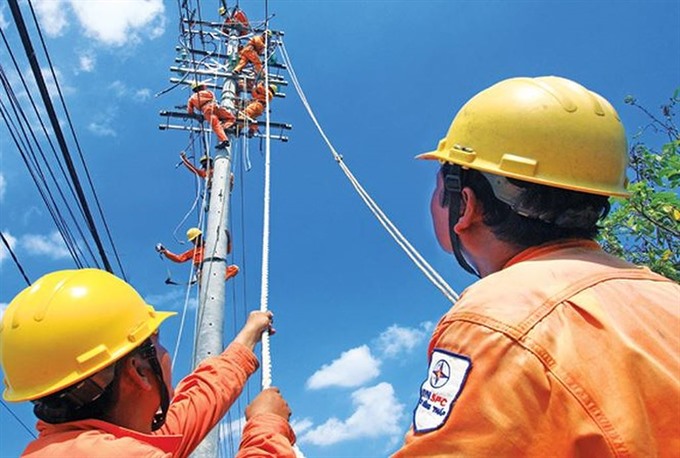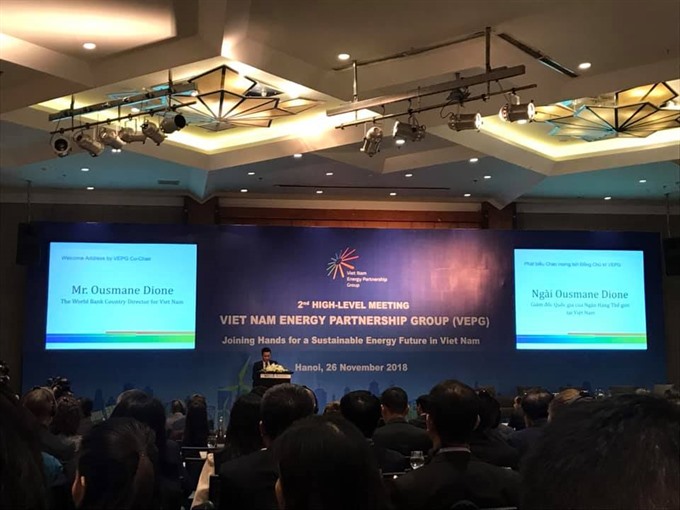 Economy
Economy

The challenges the power sector needs to overcome over the next two decades are substantial to ensure it achieves its goals to provide sustainable, clean, affordable and reliable power supply to the people of Việt Nam.
 |
| The challenges the power sector needs to overcome over the next two decades are substantial to ensure it achieves its goals to provide sustainable, clean, affordable and reliable power supply to the people of Việt Nam.— Photo baodauthau.vo |
HÀ NỘI — The challenges the power sector needs to overcome over the next two decades are substantial to ensure it achieves its goals to provide sustainable, clean, affordable and reliable power supply to the people of Việt Nam.
Ousmane Dione, Country Director of the World Bank in Việt Nam told the meeting of the Việt Nam Energy Partnership Group (VEPG) held in Hà Nội on Monday that one key question was how to meet future energy demand, while also complying with the Government’s objectives to reduce greenhouse gas (GHG) emissions and meet its climate change targets. That of course refers to the contentious issue of the role of coal in the future energy mix.
“Another challenge is how to mobilise the large investment requirements, estimated at around US$8 billion annually to meet fast growing power demand. Việt Nam Electricity (EVN) and the public sector cannot raise those funds and the private sector, both domestic and international, will need to play a more prominent role in power sector financing,” he said.
He added that Việt Nam has been a global success story in developing the power sector over the last few decades. The success of the power sector has been a key contributor to Việt Nam’s socio-economic development and the country’s high and sustained economic growth, excellent performance in terms of poverty reduction and well-being of its citizens. Two areas need to be highlighted in the success story – one is rural electrification and the other power sector reform.
“The World Bank is fully supportive of Việt Nam’s energy development agenda, including the 5 key priorities discussed at today’s high-level meeting. We are committed to helping Việt Nam deliver sustainable, clean, reliable and affordable energy for all, including technical and policy advice, direct investment financing, risk mitigation measures and guarantees, supporting regulatory reform, improving energy security, and helping Việt Nam meet its Nationally Determined Contributions as part of the Paris Agreement.”
Sharing the sentiment, Ambassador Bruno Angelet, Head of the European Union delegation to Việt Nam added: “The EU is very committed to helping Việt Nam’s transition from brown to green energy, while also ensuring access to affordable energy for all and protecting Việt Nam’s competitiveness. We are extremely proud that the Việt Nam Energy Partnership Group could deliver, within one year, recommendations for comprehensive policy reform. They are the result of intense consultations with the Government, the private sector, academia and civil society. Our strong wish is that our recommendations will be embedded in Việt Nam’s strategic policy papers and will be translated into concrete policy actions."
 |
| Experts discuss challenges and policy recommendations for Việt Nam’s energy sector. — VNS Photo Vũ Hoa |
The highlight of the event was the presentation of policy recommendations by the VEPG’s Technical Working Groups (TWG) aimed at boosting the development of Việt Nam’s energy sector in five key priority areas, namely Renewable Energy, Energy Efficiency, Energy Sector Reform, Energy Access and Energy Data and Statistics. Each TWG delivered and discussed a set of concrete policy recommendations, developed through extensive research and dialogue by TWG members over the past year.
Đặng Hoàng An, Deputy Minister of Industry and Trade, said Việt Nam has been in a process of deep international integration. This calls for building a national energy sector under market mechanisms that is highly integrated and adaptable.
To ensure that, Viet Nam needs to effectively promote the combination of internal and external resources, in which the internal force is a key element, An said.
He added that in the process of promoting investment and development of the energy sector, it was necessary to thoroughly study and consider international and domestic contexts and trends as well as domestic potential to building development plans to ensure sustainability of the sector.
“Today, we received nearly 40 policy recommendations which are the results of the work of VEPG’s five Technical Working Groups. These policy recommendations are valuable and truly relevant to the policy development of Việt Nam’s energy sector,” he said.
The VEPG was established in June 2017 in an agreement between the Government of Việt Nam and Development Partners with the purpose of strengthening mutual partnerships and better aligning and coordinating external support to the energy sector in Việt Nam. — VNS




